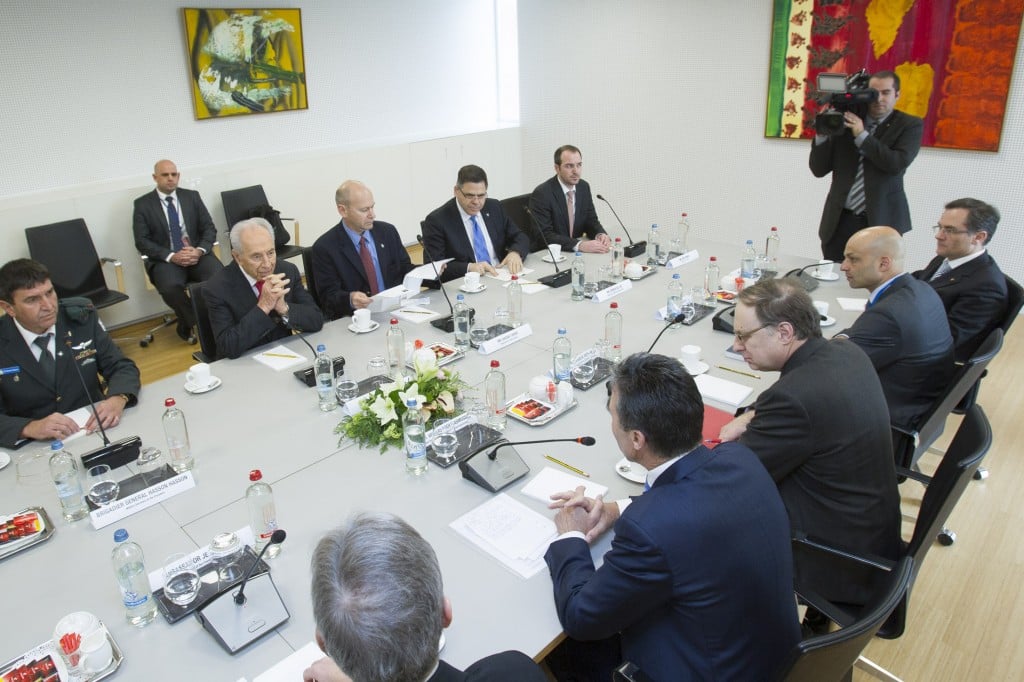|
This article was first published in March 2013
Author’s Note
The establishment by Israel of a permanent mission at the headquarters of NATO in Brussels should come as no surprise. An all encompassing bilateral agreement was signed in 2005, which was followed by a 2013 agreement pertaining to enhanced military cooperation.
Israel is a de facto member of the Atlantic alliance.
The establishment of a permanent mission at NATO headquarters is the culmination of more than ten years of Israel-NATO cooperation.
Israel’s Ambassador to the EU, David Walzer, will be heading Israel’s permanent mission to NATO headquarters, following a decision of the North Atlantic Council.
Michel Chossudovsky, May 8, 2016
In March 2013, NATO Secretary General Anders Fogh Rasmussen received Israel’s president Shimon Peres at NATO headquarters. The order of the day was to enhance military cooperation between Israel and the Atlantic Alliance focusing on issues of counter-terrorism.
“Israel will be happy to share the knowledge it has gained and its technological abilities with NATO. Israel has experience in contending with complex situations, and we must strengthen the cooperation so we can fight global terror together and assist NATO with the complex threats it faces including in Afghanistan. “
Israel is already involved in covert operations and non-conventional warfare in liaison with the US and NATO.
 This 2013 agreement is of particular significance because it deepens the Israel-NATO relationship beyond the so-called “Mediterranean Dialogue”. The joint statement points to an Israel NATO partnership “in the fight against terror and the search for peace… in the Middle East and the world”. This 2013 agreement is of particular significance because it deepens the Israel-NATO relationship beyond the so-called “Mediterranean Dialogue”. The joint statement points to an Israel NATO partnership “in the fight against terror and the search for peace… in the Middle East and the world”.
What this suggests is the participation of Israel in active theater warfare alongside NATO –i.e. as a de facto member of the Atlantic Alliance.
In other words, Israel would be directly involved is US-NATO military operations in the Middle East. Israel offered to assist NATO in counter-terrorism operations directed against Hezbollah and Iran.
“The two agreed during their discussions that Israel and NATO are partners in the fight against terror…the statement said.
President Peres stressed the need to maintain and increase the cooperation between Israel and NATO and Israel’s ability to cooperation and provide technological assistance and knowledge from the vast experience Israel had gained in the field of counter-terrorism.
“Israel will be happy to share the knowledge it has gained and its technological abilities with NATO. Israel has experience in contending with complex situations, and we must strengthen the cooperation so we can fight global terror together and assist NATO with the complex threats it faces including in Afghanistan, ” Peres told Rasmussen.
History of Israel-NATO Military Cooperation
It is worth noting that in November 2004 in Brussels, NATO and Israel signed an important bilateral protocol which paved the way for the holding of joint NATO-Israel military exercises. A followup agreement was signed in March 2005 in Jerusalem between NATO’s Secretary General and Prime Minister Ariel Sharon.
The 2005 bilateral military cooperation agreement was viewed by the Israeli military as a means to “enhance Israel’s deterrence capability regarding potential enemies threatening it, mainly Iran and Syria.”
The ongoing premise underlying NATO-Israel military cooperation is that “Israel is under attack”.
There is evidence of active military and intelligence coordination between NATO and Israel including consultations pertaining to the occupied territories.
“Before Operation Cast Lead was launched in Gaza, NATO was already exchanging intelligence with Israel, sharing security expertise, and organising military drills. …. Former NATO chief Scheffer visited Israel in the midst of Israel’s offensive on Gaza. And NATO officials were at the time of the opinion that cooperation with Israel was essential for their organisation. (Al Ahram, February 10, 2010)
The March 2013 Israel-NATO Brussels bilateral agreement is the culmination of more than ten years of Israel-NATO cooperation.
Does this agreement “obligate” NATO “to come to the rescue of Israel” under the doctrine of “collective security”?
The agreement tightens the ongoing process of US-NATO-Israel military planning and logistics relating to any future operation in the Middle East including an aerial bombing of Iran’s nuclear plants.
The Israeli presidential delegation consisted of several top military and government advisers, including Brigadier General Hasson Hasson, Military Secretary to President Peres (See image below: first from left) and Nadav Tamir, policy adviser to the president of Israel (first right of president Peres).
The text of the Israel NATO agreement following discussions behind closed doors (see image below) was not made public.

(Click image to enlarge)
Following the meeting, a joint statement was released by NATO. Secretary-General Rasmussen stated in the press report:
“Israel is an important partner of the Alliance in the Mediterranean Dialogue. The security of NATO is linked to the security and stability of the Mediterranean and of the Middle East region. And our Alliance attaches great value to our political dialogue and our practical cooperation. Israel is one of our longest-standing partner countries. We are faced with the same strategic challenges in the Eastern Mediterranean.
And as we face the security threats of the 21st century, we have every reason to deepen our long-standing partnership with our Mediterranean Dialogue countries, including Israel. We all know the regional situation is complex. But the Mediterranean Dialogue remains a unique multilateral forum, where Israel and six Arab countries can discuss together with European and North American countries common security challenges. I see further opportunities for deepening our already close political dialogue and practical cooperation to our mutual benefit.”
|